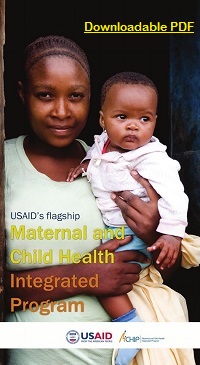 The USAID Bureau for Global Health’s flagship Maternal and Child Health Integrated Program (MCHIP) worked in more than 50 developing countries in Africa, Asia, Latin America and the Caribbean to improve the health of women and their families. MCHIP supported programming in maternal, newborn and child health, immunization, family planning, nutrition, malaria and HIV/AIDS, and encouraged opportunities for integration of programs and services when feasible.
The USAID Bureau for Global Health’s flagship Maternal and Child Health Integrated Program (MCHIP) worked in more than 50 developing countries in Africa, Asia, Latin America and the Caribbean to improve the health of women and their families. MCHIP supported programming in maternal, newborn and child health, immunization, family planning, nutrition, malaria and HIV/AIDS, and encouraged opportunities for integration of programs and services when feasible.
Building on program experience and lessons learned (from ACCESS, BASICS, IMMUNIZATIONbasics, POPPHI, ACCESS-FP, and Child Survival Technical Support Plus [CSTS+]), MCHIP addressed the barriers to accessing and using key evidence-based interventions across the life stages—from pre-pregnancy to age 5—by linking communities, primary health facilities, and hospitals. By helping countries identify and focus on those innovations that will save lives, MCHIP supported delivery of evidence-based interventions through strengthening government health systems, nongovernmental organizations, and other local partners.
MCHIP’s overall strategic approach was guided by five interrelated principles:
- Taking high-level impact interventions to scale
- Ensuring country ownership
- Creating change through global and regional influence
- Improving measurement and use of data at the country and global levels
- Expanding coverage through integrated approaches
Under this Leader with Associates Award (LWA), USAID Missions and Regional Bureaus could access the project through traditional field support and MAARD mechanisms to the Leader award, or through stand-alone Associate Awards. In addition to the MNCH priority countries, MCHIP could work in any country with Mission or regional Bureau funds.
[1]See “Working Toward the Goal of Reducing Maternal and Child Mortality: USAID Programming and Response to FY08 Appropriations”, July 2008
